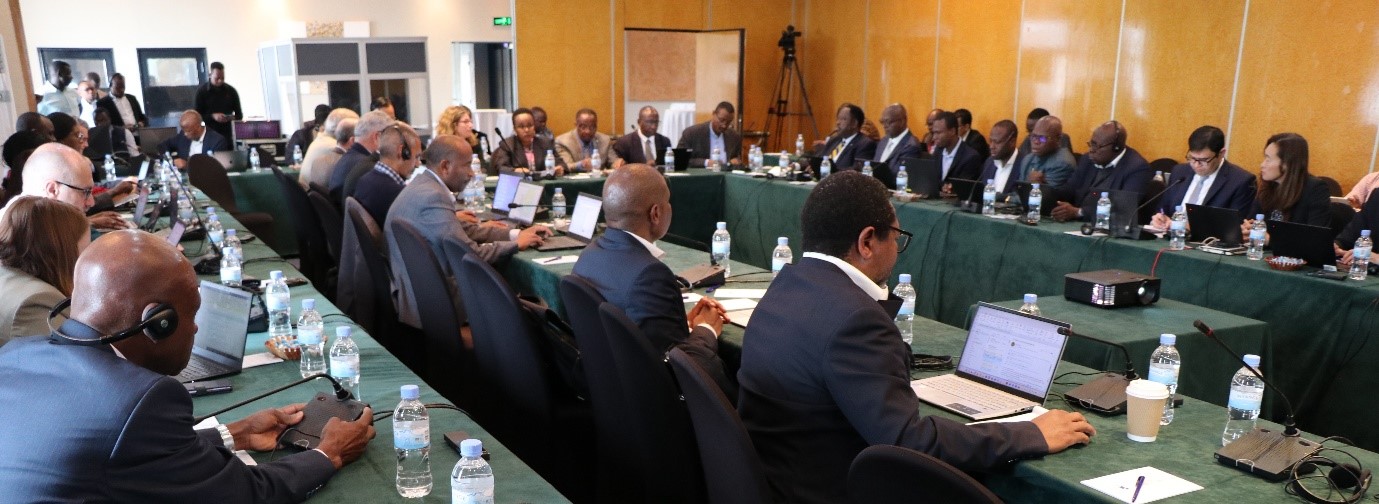
Mwanga CMP Platform
News
2023 marks a turning point in collaborative efforts to bridge the energy infrastructure gaps across Africa
23 March 2023, Kigali, Rwanda
About sixty energy experts convened in Kigali this week to co-create solutions to tackle energy poverty in Africa and address the expected surge in electricity demand. Major resolutions were reached that will impact the execution of three African Union initiatives: the African Single Electricity Market (AfSEM), the Continental Power Systems Masterplan (CMP) and the African Energy Efficiency Strategy (AfEES).

Access to affordable clean energy remains one of Africa’s biggest challenges. The electricity demand across the continent is expected to triple by 2040 due to various factors such as industrialization, urbanization, higher household incomes, and climate change. The abundant renewable energy resources of African nations have the capability to fulfill this demand, but it is necessary to first establish the physical interconnection of the continent's energy infrastructure.The AfSEM, CMP and AfEES programmes are crucial in linking the continent's regional energy infrastructure.
Extensive consultations to accelerate Africa’s energy transition
Connecting Africa’s five regional power pools will not only pave the way for one of the largest electricity markets in the world, but it will also help curb the electricity deficit and allow a well-balanced sharing of resources. The past three years have seen significant progress for the CMP in its mission to establish a long-term continent-wide planning process for power generation and transmission involving all five African power pools.
Attendees of the CMP stakeholders meeting had the chance to review and approve two important deliverables that were created through key support from the EU Global Technical Assistance Facility for Sustainable Energy (EU-GTAF) in collaboration with the African Union Development Agency (AUDA-NEPAD) and all regional Power Pools:
• The first report, titled "Integrated Continental Demand Forecasts - Scenario Analysis", provides further insight into the African electricity demand by 2040, based on the initial findings of the reference case continental electricity demand forecasts presented earlier in 2022. It highlights the vast needs for new power infrastructure in the next years.
• The second report, named "2020 - 2040 Baseline and Reference Case Planning Scenario Results", summarizes the outcomes and key results from the optimization runs of the SPLAT-Africa model. The latter aims to determine the optimal generation and transmission projects, as well as their respective capacities, to meet the reference case energy demand projected up to 2040 from a techno-economic perspective. It highlights the shift towards renewable energy generation and transmission connectivity throughout Africa.
A clear vision to unlock the potential of the African Single Electricity Market
Additionally, stakeholders participated in consultations regarding the new phase of the AfSEM, which requires comprehensive strategic planning to come to fruition. Officially launched in June 2021, the AfSEM has five strategic documents outlining regulatory readiness, technical and operational readiness, market readiness, market liberalization, utility restructuring, institutional strengthening, and governance.
Following thorough consultations with stakeholders at both continental and regional levels, the strategic objectives, strategies, and action plan were the fruit of a collaboration between the AUC Department of Infrastructure and Energy (AUC-DIE) and the EU GTAF. The strategic objectives of AfSEM were also carefully evaluated by various organizations like AUDA-NEPAD, the African Energy Commission Regional Regulators, the African Forum for Utility Regulators (AFUR), and the Association of Power Utilities of Africa (APUA) to ensure energy security in Africa amidst global energy challenges.

Taking stock of energy efficiency (EE) policies to accelerate EE action in Africa
The objectives of the AfSEM cannot be met without solid energy efficiency strategies. This is why, starting from January 2023, a comprehensive inventory project has been initiated to collect energy efficiency data across Africa and establish clear objectives for the continent. The EU GTAF is leading the effort to lay the groundwork for a robust AfEES and action plan.
A report on EE institutional arrangements and initiatives in Africa is now available, resulting from a bottom-up approach, and developed in collaboration with the Centers for Regional Renewable Energy and Energy Efficiency. The report identifies regional and national EE action plans and guidelines and draws upon EE targets from international frameworks.
The joint AfSEM, CMP and AfEES stakeholders meeting was organised by the AUC, AUDA-NEPAD and Africa Energy Commission (AFREC) in collaboration with the Ministry of Infrastructure of the Republic of Rwanda and the EU GTAF.
The gathering represented a major milestone in the work carried out in the scope of the partnership between the AU and the EU for the harmonisation of the African electricity market. It also served as an opportunity to reaffirm the commitment and contributions of all parties involved in implementing these three programmes that will impact the daily lives of 1.3 billion people.
Implemented with support from
..